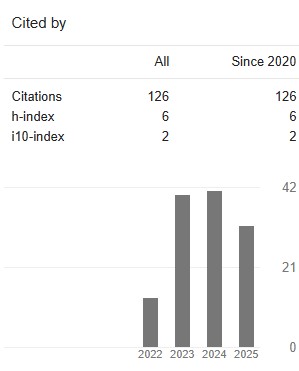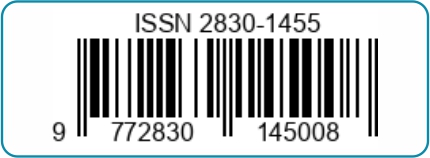Praktik Kerja Sama Bagi Hasil Ternak Kambing (Kambi’) Perspektif Hukum Islam (Studi Kasus Desa Tangru Kecamatan Malua Kabupaten Enrekang)
The Practice of Profit Sharing Cooperation of Goat (Kambi') in Islamic Law Perspective (Case Study of Tangru Village, Malua District, Enrekang Regency)
DOI:
https://doi.org/10.36701/al-khiyar.v2i2.655Keywords:
profit and lost sharing, muḍārabah, goat, kambi’, Islamic lawAbstract
This study aims to: (1) determine the practice of sharing goats (kambi') in Tangru Village, Malua District, Enrekang Regency; and (2) knowing the views of Islamic law on the practice of sharing the results of the goat (kambi') livestock. This research is a qualitative research through field research with a normative and empirical juridical approach. The results of the study show the following things. First, the practice of kambi' in Tangru Village can be briefly described as follows: (1) related to the contract, the practice of kambi' in Tangru Village is a cooperation agreement in animal husbandry, with the object of the contract, namely goats, with a profit-sharing mechanism; (2) related to rights and obligations, livestock owners and breeders are entitled to get results according to the agreement, livestock owners are obliged to hand over capital to breeders, while breeders are obliged to care for and breed goats as the object of the contract; (3) related to risk coverage, the occurrence of losses on capital will be borne by the livestock owners as long as the losses arise due to something unintentional; and (4) regarding profit sharing, the parties agree on a 50:50 distribution ratio. Second, in the view of Islamic law, the practice of the contract is permissible, as long as it is carried out in accordance with the pillars and conditions. However, there are several notes that should be noted, namely: (1) the cooperation agreement is not made in writing; (2) there is no agreement regarding the potential loss that occurs due to negligence of the breeder; (3) there are still some cooperation actors who have not determined the profit-sharing ratio at the beginning of the contract, but only stipulate it after the goat gives birth for the first time.
Downloads
References
Aminah, Siti, “Kajian Terhadap Bagi Hasil Ternak Kambing Dalam Prespektif Hukum Ekonomi Syariah (Studi Kasus di Desa Sanggar Buana Kec. Seputih Banyak Kab. Lampung Tengah)” Skripsi, Metro Lampung: Fak Syariah Institut Agama Islam Negeri Metro Lampung, 2017.
Basri, Adib, dan Munawwir, al-Bisri. Kamus Bahasa Arab-Indonesia, Indonesia-Arab. Surabaya: Pustaka Progressif, 1992.
al-Hajjaj, Muslim ibn, Ṣaḥīh Muslim, Juz 3 Beirūt: Dār Iḥyāa al-Turāṡ, t,th.
Ikram, Dzulzalali Wal, “Praktik Bagi Hasil Hewan Ternak (Asesang) Dalam Perspektif Hukum Islam (Studi Kasus Di Desa Manuju, Kecamatan Manuju, Kabupaten Gowa)” Skripsi, Makassar: Fak. Syariah Sekolah Tinggi Ilmu Islam dan Bahasa Arab STIBA Makassar, 2019.
Ilmi, Makhalul.Teori dan Praktek Lembaga Mikro Keuangan Syari’ah. Yogyakarta: UII Press, 2002.
Kementerian Agama Republik Indonesia. Terjemah Tafsir Perkata. Bandung: Syamil al-Qur’an, 2010.
Muhammad, Abdulkadir. Hukum dan Penelitian Hukum. Bandung: Citra Aditia Bakti, 2004.
Munalia. “Sistem bagi hasil pemeliharaan sapi menurut perspektif akad mudharabah (Studi kasus di desa Rabeu Kecamatan Kuta baro, Aceh besar)” Skripsi, Banda Aceh: Fakultas Syari’ah dan Hukum Universitas Islam Negeri Ar-Raniry, 2019.
Munthe, Yuriza Ahmad Gustina. “Analisis Penerapan Sistem Bagi Hasil Belah Sapi Dalam Peternakan Sapi Di Desa Lobu Rampah Kecamatan Marbau Kabupaten Labuhan Batu Utara” Skripsi, Medan: Fak. Ekonomi Islam Universitas Islam Negeri Sumatera Utara, 2018.
Musṭafā, Ibrāhim dkk. al-Mu’jam al-Wasīṭ, Juz I Istanbul: al- Maktabah al-Islāmiyyah 1431 H
Mutiah, Imroatul. “Analisis Praktek Jual Beli Produk Pertanian Bayar Panen dalam Perspektif Hukum Ekonomi Islam di Desa Barurejo. Kec Siliragung Kab Banyuwangi”. Jurnal Darussalam: Jurnal Pendidikan dan Pemikiran Hukum Islam, X No 1 (2018): h. 191.
Mutiah, Imroatul. “Analisis Praktek Jual Beli Produk Pertanian Bayar Panen dalam Perspektif Hukum Ekonomi Islam di Desa Barurejo. Kee Siliragung Kab Banyuwangi”. Jurnal Darussalam: Jurnal Pendidikan dan Pemikiran Hukum Islam, X No 1 (2018) h. 180-195
Sābiq, Sayyid. Fiqh al-Sunnah, Cet. III; Bairut: Dār al-Kitāb al-‘Arabi, 1988.
al-Qazwini, Hafidz Abi Abdillah Muḥammad Ibnu Yazid. Sunan Ibnu Majah, Jilid 2; Darul Fikri, 207-275 M.
Sugiono. Metode penilitian kuantitatif dan kualitatif dan R&D. Bandung: Alfabeta, 2009.
Umar, Al-Imam Al-Hafidz Ali Bin. Sunan Al-Dāraquṭnī, Jakarta: Pustaka Azzam, 2008.
Faisal (44), Wawancara, Tangru, 10 Agustus 2022.
Lamin (48 tahun), Peternak, Wawancara, Tangru, 20 Juli 2022.
Muhajir (42 tahun), Pemilik ternak, Wawancara, Tangru, 19 Juli 2022.
Mukmin (43 tahun), Peternak, Wawancara, Tangru, 20 Juli 2022.
Mukmin (46 tahun), Peternak, Wawancara, Tangru, 20 Juli 2022.
Rahman (50 tahun), Pemilik ternak, Wawancara, Tangru, 20 Juli 2022.













